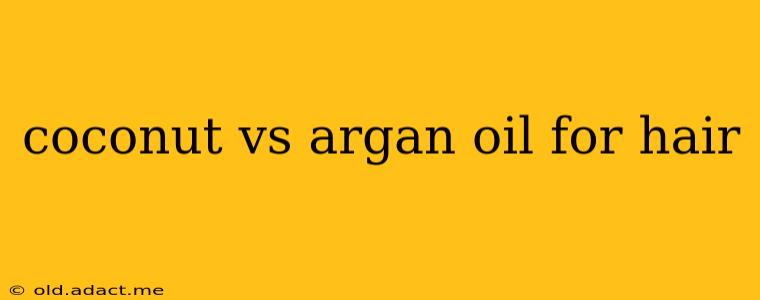Choosing between coconut oil and argan oil for your hair can feel overwhelming. Both are celebrated for their hair-health benefits, but their properties differ, making one a better choice than the other depending on your specific hair needs. This comprehensive guide will delve into the unique advantages of each oil, helping you make an informed decision.
What are the benefits of coconut oil for hair?
Coconut oil, extracted from the kernel of coconuts, is a saturated fat rich in lauric acid. This fatty acid is easily absorbed by the hair shaft, providing excellent moisturizing and conditioning properties. Its benefits include:
- Deep Conditioning: Coconut oil effectively penetrates the hair shaft, moisturizing and strengthening from within. This is especially beneficial for dry, damaged, or brittle hair.
- Reduced Protein Loss: Studies suggest coconut oil can reduce protein loss in hair, minimizing damage and breakage. This is crucial for maintaining hair length and overall health.
- Scalp Health: It can help soothe an irritated scalp, potentially reducing dandruff and promoting a healthy scalp environment.
- Improved Hair Elasticity: By moisturizing and strengthening hair, coconut oil can increase its elasticity, making it less prone to breakage.
What are the benefits of argan oil for hair?
Argan oil, sourced from the kernels of the argan tree fruit, is rich in antioxidants, fatty acids, and vitamin E. This potent combination makes it a popular choice for various hair concerns:
- Shine and Smoothness: Argan oil is known for its ability to add incredible shine and smoothness to the hair, leaving it looking healthy and radiant.
- Frizz Control: Its moisturizing properties effectively tame frizz and flyaways, especially in humid conditions.
- Heat Protection: Applying argan oil before heat styling can create a protective barrier, reducing heat damage to the hair strands.
- Damage Repair: The antioxidants in argan oil help protect hair from environmental stressors, while the fatty acids contribute to repair and restoration of damaged hair.
Which oil is better for dry hair?
Both coconut and argan oils are excellent moisturizers, but their application methods might differ slightly. For severely dry hair, coconut oil's deep penetration may provide more intense hydration. Argan oil, while also moisturizing, is lighter and may be better suited for those with dry hair that tends to be weighed down by heavier oils.
Which oil is better for damaged hair?
Both oils boast repair properties. Coconut oil's ability to reduce protein loss makes it effective at preventing further damage, while argan oil's antioxidants protect against future damage and help to repair existing damage. The best choice depends on the type and extent of damage.
Which oil is best for fine hair?
For fine hair, argan oil is generally the better option. Its lighter texture is less likely to weigh down fine hair, while still providing moisturizing and shine benefits. Coconut oil, being thicker, might prove too heavy for fine hair, potentially making it look limp and greasy.
Can I use both coconut oil and argan oil together?
Yes, you can certainly use both oils together! Many find that combining them enhances the benefits. For example, you could use coconut oil as a deep conditioning treatment overnight and then follow up with argan oil as a leave-in conditioner to add shine and control frizz. However, start with small amounts to avoid weighing down your hair.
How often should I use coconut oil or argan oil on my hair?
The frequency depends on your hair type and needs. For dry or damaged hair, weekly deep conditioning treatments with either oil may be beneficial. For fine hair or those with an oily scalp, using these oils less frequently, perhaps once or twice a month, is recommended. Always observe your hair's response and adjust accordingly.
Are there any side effects of using coconut or argan oil on my hair?
While generally safe, some individuals might experience allergic reactions, particularly if they have sensitive skin or allergies to nuts (in the case of argan oil). Always perform a patch test before applying any oil to your entire scalp or hair. Excessive use can also lead to build-up, resulting in greasy or heavy hair.
This comprehensive comparison should equip you with the knowledge to select the best oil for your hair type and concerns. Remember, the key is to find what works best for your hair. Experimentation is encouraged!
